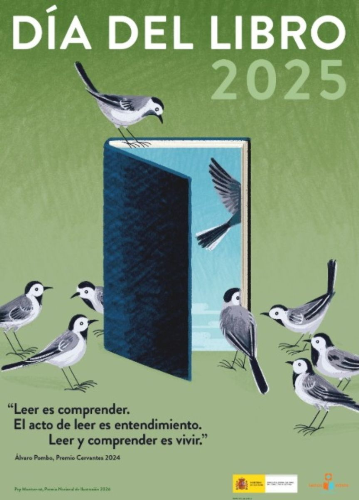
©
Іспанія відкриває свої сторінки до нового розділу святкування — з 21 по 25 квітня країна поринає у «Тиждень Сервантеса», присвячений книжкам, авторам і читачам. У центрі уваги — вручення Премії Сервантеса 2024, найвищого літературного визнання іспаномовного світу, цьогоріч удостоєного письменник Альваро Помбо (1939). Церемонія, яку очолить королівське подружжя, відбудеться в історичних стінах Університету Алькала-де-Енарес — колиски гуманістичної думки Іспанії. Це не просто свято книги — це маніфест культурної присутності. Виставки, театралізовані читання, тематичні кінопокази, вечори поезії та відкриті бібліотеки — вся Іспанія на кілька днів перетворюється на велетенську сцену літературного діалогу. Однією з найочікуваніших подій стала презентація першого перекладу Дон Кіхота аранською мовою — Don Quishòt d’Era Mancha. Цей проєкт, здійснений за підтримки Міністерства культури Іспанії та Академії аранської гілки окситанської мови, є символом збереження мовного різноманіття в літературному каноні. Filmoteca Española також долучається до діалогу між словом і зображенням: у її програмі — покази артхаусного кіно, присвяченого темі книжок, з подальшими розмовами між режисерами, авторами та критиками. Серед стрічок — «Перша шпальта», «Рукопис, знайдений у Сарагосі» та «Ідіот», кожна з яких відкриває нові шляхи до осмислення літературної спадщини. Письменник Альваро Помбо, не лише лауреат, а й активний учасник святкування, того ж дня відкриє XXIX Безперервне читання Дон Кіхота, що відбуватиметься в онлайн-форматі з Círculo de Bellas Artes у Мадриді. Пряма трансляція дозволить приєднатися до читання всім охочим — незалежно від місця проживання. Варто пам’ятати, що символізм 23 квітня — глибший за календарну позначку. Саме цього дня 1616 року світ втратив Міґеля де Сервантеса, Вільяма Шекспіра та Інку Гарсіласо де ла Веґу. У різні роки цієї ж дати народилися або пішли у вічність і такі постаті, як Жозеп Пла чи Мануель Мехія Вальєхо. Відтак, у 1995 році ЮНЕСКО обрало саме цей день як Всесвітній день книги та авторського права — як акт шани до літератури й авторської думки, що формує культурну самосвідомість людства.
Spain reads aloud: Cervantes, Don Quixote and thousands of literary events
From 21 to 25 April, Spain opens a new chapter in its cultural calendar with Cervantes Week — a nationwide celebration dedicated to books, authors, and readers. At its heart lies the presentation of the 2024 Cervantes Prize, the most prestigious literary honour in the Spanish-speaking world, awarded this year to novelist Álvaro Pombo (1939). The ceremony, presided over by the Spanish royal couple, will take place in the historic halls of the University of Alcalá de Henares — long considered a cradle of humanist thought. But this is far more than a celebration of literature; it is a declaration of cultural vitality. Across the country, exhibitions, theatrical readings, curated film screenings, poetry evenings, and open-library events will transform Spain into a stage for literary dialogue and discovery. Among the most anticipated moments is the unveiling of the first-ever Aranese-language translation of Don Quixote — Don Quishòt d’Era Mancha. Supported by the Ministry of Culture and the Aranese branch of the Occitan Language Academy, this project symbolises a commitment to linguistic diversity within the broader literary canon. Spain’s national film archive, Filmoteca Española, is also contributing to the week-long dialogue between word and image. Its special programme features arthouse cinema that explores literary themes, followed by discussions with directors, writers and critics. Films include The Front Page, The Saragossa Manuscript and The Idiot — each offering a distinct lens through which to interpret literary heritage on screen.Pombo, both honouree and participant, will also inaugurate the 29th Continuous Reading of Don Quixote, streamed live from Madrid’s Círculo de Bellas Artes. This virtual reading marathon invites audiences worldwide to take part in a collective act of storytelling — no matter their location.It is worth remembering that the symbolism of 23 April goes far beyond the calendar. On this day in 1616, the world lost three literary giants: Miguel de Cervantes, William Shakespeare, and Inca Garcilaso de la Vega. In later years, authors such as Josep Pla and Manuel Mejía Vallejo would also be born — or pass — on this date. For this reason, UNESCO in 1995 officially declared 23 April as World Book and Copyright Day: a tribute to literature, to authorship, and to the enduring role of the written word in shaping cultural identity across the globe.

©
1127